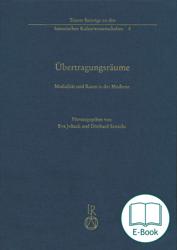In this volume, whose authors explore conceptions of space from the 18th to the 20th century, focusing on the role of the body and the senses as well as the importance of the mediality of space, putative new forms of energy and medial trance. In the interface of physiology and physics, electricity and ecstasy, modern spaces of transference can develop.
That the experience of space and time always depends on the conditions of transmission through the media becomes apparent when we consider the revolutions in media technology in the 19th and 20th centuries. More than that, spaces are even created through media, when new technologies of transmission generate fantasies about the structure of the space that they bridge. In connection with that we must consider the perception of the relationship between spatiality and sensual perception, for to this day revolutions in media technology turn out to be linked to the attempt to increase the organic functions of the sensory organs or even to expand them into the extrasensory. As a quasi-countermovement and a complementary tendency, corporeality gains new significance parallel to the development and refinement of technical transmission media: The body as a medium is physiologically and psychologically surveyed with more precision than ever with regard to its abilities of sending, receiving, and transmitting.
The volume “Übertragungsräume” focuses on a field of discourses and practices which is demarcated by the corners space – humans – mediality: In which areas of discourse and society did the knowledge of spaces of transmission develop? Which ontological status was ascribed to these spaces? What consequences did fantasies of all-pervasive aetherial fluids, rays and waves have for popular and academic concepts of space? In their oscillation between scientific/technical and religious/transcendent aspects, medial spaces are a challenge for cultural research on space and spatiality.
The papers in this volume discuss, among other topics, philosophical-physiological speculations in Herder, considerations of space-theory and communication technologiy in Kleist, the physiology of the senses in 19th century German science, the genius of Nikola Tesla, the retrovisionary revival of ancient Rome by Alfred Schuler, the debates between Einstein and Bergson, Walter Benjamin’s theory of the media, the energetic cosmology of Wilhelm Reich, experiences of space through dance and meditation in Erwin Straus and Karlfried Graf Dürkheim as well as somnambulistic and psychopharmacologically evoked journeys through space. The authors are cultural researchers of various disciplines.
Eva Johach
Studium der Biologie, Chemie und Kulturwissenschaften in Erlangen, Lüneburg und Berlin. 2006 Promotion am Kulturwissenschaftlichen Seminar der Humboldt-Universität Berlin mit einer Arbeit über politisch-medizinische Krebsmetaphorik im 19. Jahrhundert. 2007-2009 Postdoktorandin im DFG-Graduiertenkolleg „Geschlecht als Wissenskategorie“ und wissenschaftliche Mitarbeiterin am Institut für Kulturwissenschaft der HU Berlin. Danach Stipendiatin am Historisch-Kulturwissenschaftlichen Forschungszentrum der Universität Trier. Seit August 2010 Stipendiatin der DFG an der Professur für Wissenschaftsforschung der ETH Zürich mit einem Projekt zur Wissensgeschichte von Insektengesellschaften. Forschungsschwerpunkte: Wissensgeschichte, Kulturtheorie und Kulturgeschichte, menschliche und tierische Kollektive, Krankheitstheorien und Sozialpathologien, Wissen und Esoterik.
Diethard Sawicki
Studium der Geschichte, russischen Philologie und Philosophie, 1999 Fellow am Kulturwissenschaftlichen Institut Essen, Promotion in Geschichtswissenschaft zur Geschichte von Geisterglauben und Spiritismus in Deutschland 1770-1900. Seit 2001 Lektor in einem geisteswissenschaftlichen Verlag. Forschungsschwerpunkte: Themen im Spannungsfeld von Wissenschafts-, Religions- und Technikgeschichte der Neuzeit, Esoterik - Chiliasmen - Sozialutopien, Theorien des historischen Wandels von Wissensordnungen.
The new publication series entitled “Trierer Beiträge zu den historischen Kulturwissenschaften” (Trier Papers in Historical Cultural Studies) aims at being a forum for papers in the area of Cultural Studies, which focus on historical and interdisciplinary research. In addition to essay collections and conference proceedings, the series also covers monographic studies as well as exhibition catalogues.
The editor of the book series is the Executive Board of the “Historisch-Kulturwissenschaftliche Forschungszentrum” (HKFZ) Trier (Trier Historical Cultural Research Centre) at Trier University. The Research Centre is financed in line with the research initiative of Rhineland-Palatinate. The HKFZ’s current research topic is called “Räume des Wissens – Orte, Ordnungen, Oszillationen” (“Spaces of Knowledge – Places, Orders, Oscillations”). In collaboration with national and international partners, groups of linked projects work on this topic at Trier University.


 Sample
Sample